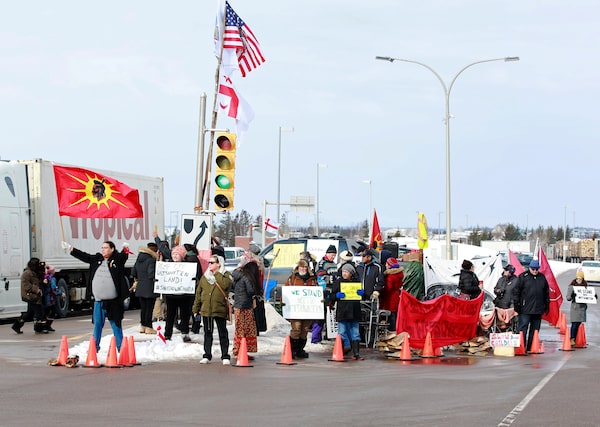
People take part in a protest in solidarity with the Wet'suwet'en hereditary chiefs opposed to the LNG pipeline in northern B.C. near Confederation Bridge in Borden, Prince Edward Island on Feb. 17, 2020. With the hereditary chiefs now on a fast track to settle Indigenous rights and title, elected leaders who have approved the pipeline project say they cannot be ignored.John Morris/The Canadian Press
Elected band council chiefs of Wet’suwet’en Nation are demanding a voice on the tentative agreement reached this past weekend between hereditary chiefs and the governments of Canada and British Columbia, saying negotiations so far have taken place without their involvement.
The division between elected and hereditary chiefs of the Wet’suwet’en has been exposed by the construction of the Coastal GasLink pipeline through their traditional lands. Now, as the hereditary chiefs are on a fast track to settle Indigenous rights and title, elected leaders who have approved the pipeline project say they cannot be ignored.
“Negotiation of this agreement to date has moved forward without our Wet’suwet’en communities,” the elected chiefs representing the Nee Tahi Buhn Indian Band, Skin Tyee Nation, Ts’il Kaz Koh (Burns Lake) First Nation, Wet’suwet’en First Nation and the Witset First Nation stated in a joint news release.
“We need to be engaged in our feast hall, in our respective communities to ensure all of our clan members are heard and acknowledged.”
Trudeau urges patience as Wet’suwet’en mull over proposed land and title deal
Chief Patricia Prince, of the Nee Tahi Buhn Indian Band, said Tuesday the hereditary chiefs, through the Office of the Wet’suwet’en, a non-profit society, have invited her community to travel to Smithers, B.C., to discuss the terms of the proposed agreement, which have not been publicly disclosed.
“I’m not sure I can load up all our members and take them there,” she said in an interview. “We need collaboration. I would like to see them come to our communities and address our members.”
Sparked by a countrywide conflict over the pipeline, representatives of the hereditary chiefs and the Indigenous relations ministers for Canada and British Columbia met for three days in Smithers last week.
The pipeline dispute remains unresolved, with hereditary chiefs remaining opposed to the project. But the negotiations resulted in a proposal to expedite negotiations to implement Wet’suwet’en rights and title, pending ratification by Wet’suwet’en clan members.
The Wet’suwet’en say their unceded traditional territory covers 22,000 square kilometres in British Columbia. About 190 kilometres of the 670-kilometre pipeline route cross Wet’suwet’en territory.
There have been solidarity protests across the country since early February, when the RCMP arrested 28 people along a B.C. logging road while enforcing a court order sought by Coastal GasLink to gain access to pipeline work sites.
B.C. Minister of Indigenous Relations and Reconciliation Scott Fraser said Tuesday he has been in touch with both the elected and hereditary chiefs about the ratification process that is expected to conclude by March 13.
He said in an interview he expects the ratification will include both elected and hereditary leaders – and the Wet’suwet’en people.
“It’s an opportunity to address rights and title issues, and governance issues, in a meaningful way," he said. "I’m urging all to make sure that it’s an inclusive process that will withstand scrutiny.”
However, Mr. Fraser is unclear of the details of how the ratification will be conducted. He referred to a vote, but the traditional governance of the Wet’suwet’en is through feasts, where hereditary leaders are held accountable to their people.
The Wet’suwet’en Nation comprises five clans, under which there are 13 house groups, each with a hereditary head chief position (four are currently vacant). One house chief has taken a neutral position on the pipeline project.
There are eight hereditary house chiefs spanning the five clans who are opposed to Coastal GasLink. So far, three of the clans scheduled meetings this week.
Organizers have been seeking to set up access for off-reserve members to listen in on the meetings.
The Wet’suwet’en have been fighting for recognition of their rights and title for decades and a resolution is not expected quickly. But the consultation process now taking place is expected to lead to some clarity about the opposition to the pipeline within the community.
Elected band councils along the pipeline route have signed benefit agreements to work with the company.
The elected chief of the Wet’suwet’en First Nation, Maureen Luggi, said engagement by the hereditary chiefs has been “extremely minimal,” but she said the hereditary chiefs have agreed to come to her community on March 11 to outline the proposed deal.
Chief Luggi said this is the time for the elected and hereditary leaders to come together. “We want to work with them and be on the same page,” she said in an interview. “People in the public say the Wet’suwet’en need to resolve our matters, and I agree with that.”
While some protests continue, CN announced Tuesday it has started calling back most of the rail company’s temporarily laid off employees based in Eastern Canada.
More than 1,400 trains, including passenger trains, were delayed or cancelled because of the blockades, but there have been no significant illegal actions since the weekend.
Transport Minister Marc Garneau said it was a “positive development” for railways, CN workers and communities affected by recent rail disruptions. “I’m pleased to see our railway network on its way to recovery,” Mr. Garneau said on Twitter.
 Justine Hunter
Justine Hunter Wendy Stueck
Wendy Stueck Brent Jang
Brent Jang